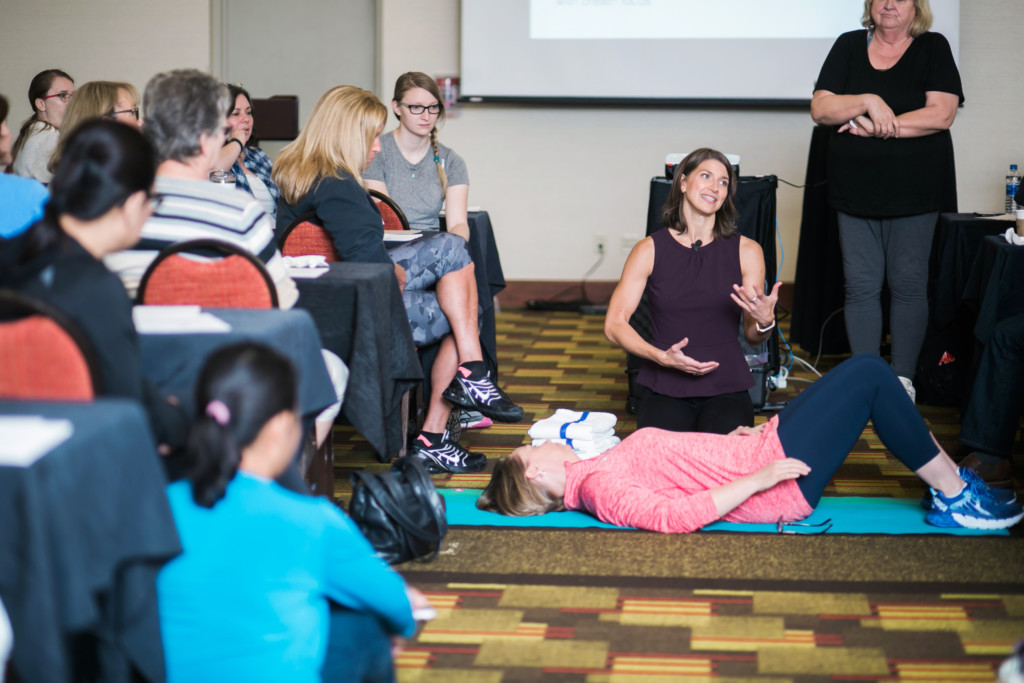Strength Training the “Floor of the Core”
By: Catherine Lewan, PT, DPT, CPI, CYT

May is National Physical Fitness and Sports Month and, of course, May 13th was Mother’s Day. So it would seem the perfect time to talk about physical fitness, female athletes, and the core.
Young female athletes who have never been pregnant are found to have high rates of pelvic floor dysfunction– one 2014 study found that 65% had urinary incontinence. Why? Well, like many things in the human body, it’s complicated. Women are naturally at risk for urinary leakage due to anatomical and hormonal reasons. Add to that any high impact plyometric exercise where the bladder is essentially bouncing on top the pelvic floor, or any kind of core strengthening that increases intra-abdominal pressure, and we have a recipe for disaster.
To prevent the kind of disaster that involves puddles on the floor, I like to remind folks that the pelvic floor is the “floor of the core,” and any female athlete should be familiar with how to activate it during any movement that increases intra-abdominal pressure in order to prevent leakage. That means every time the abdominal wall contracts, the pelvic floor should contract.
The analogy I use to describe this to my patients is this: if you are standing at the sink holding a tube of toothpaste and you squeeze it really hard in the middle, what happens if the cap isn’t on tight? Well, before we squeeze our abdominal wall, we need to put our pelvic floor “cap” on tight! Your brain knows that (unless we are at a toilet) we don’t want to squeeze anything out, so it coordinates the pelvic floor “cap” with the activation of the abdominal wall.
If you are a rehab professional, keep in mind that a sit-to-stand task increases intra-abdominal pressure more than lifting a 20# weight! Someone whose pelvic floor is weak and deconditioned may need a reminder to contract and coordinate their pelvic floor before they stand up to prevent leakage with this task.
How about the rehab professional who is transferring patients day after day? Yes indeed, that will increase your intra-abdominal pressure and put you at risk for pelvic floor dysfunction. Next time you check your body mechanics for lifting you may want to contract the floor of your core!
But what about the mommas? Childbearing is the number one risk factor for pelvic floor dysfunction, so send your mom a little extra gratitude this Mother’s Day. Perhaps you don’t ever say, “Thanks, Mom, for stretching out your abdominal wall and pelvic floor so that I could enter this world!” but you can practice pelvic floor awareness that makes a meaningful difference.
Join me for my live or online course Functional Pelvic Floor Training for Weakness, Pain, and Dysfunction in Men, Women, and Older Adults to learn evidence-informed, external techniques that you can use immediately in any setting to improve outcomes for your patients, whether they are athletes, moms, or older adults. Let’s get to the bottom of the core- and improve pelvic health, core stability, balance, posture, self-care, and quality of life while we are at it.
Dr. Catherine Lewan, PT, DPT, CYT, CPI took her first pelvic floor training course from the Women’s Health Foundation in 2006 while she was working as a full-time fitness, Yoga and Pilates instructor. She earned her Doctorate in Physical Therapy from the University of Illinois at Chicago and set out to further specialize in Orthopedic, Pelvic, and Obstetric Physical Therapy. She created the Pelvic and Abdominal Physical Therapy Program at Andersonville Physical Therapy in Chicago, which continues to grow and thrive in its mission to serve the needs of those with pelvic floor and abdominal dysfunction by providing compassionate, integrative and evidence-informed care. Dr. Lewan is a member of the Orthopedic and Women’s Health Sections of the American Physical Therapy Association, the International Association of Yoga Therapists, and the Chicagoland Pelvic Floor Research Consortium. She is a faculty member for several Chicago-based Yoga Teacher Training programs, including the Amala School of Prenatal Yoga’s 85-hour prenatal teacher training. She enjoys integrating mind-body exercise into medicine (and vice versa!) and making information about the pelvic floor accessible and entertaining for all.
You can learn more about Dr. Lewan, including free resources she shares on pelvic health, at her website, www.catherinelewan.com.

Thank you